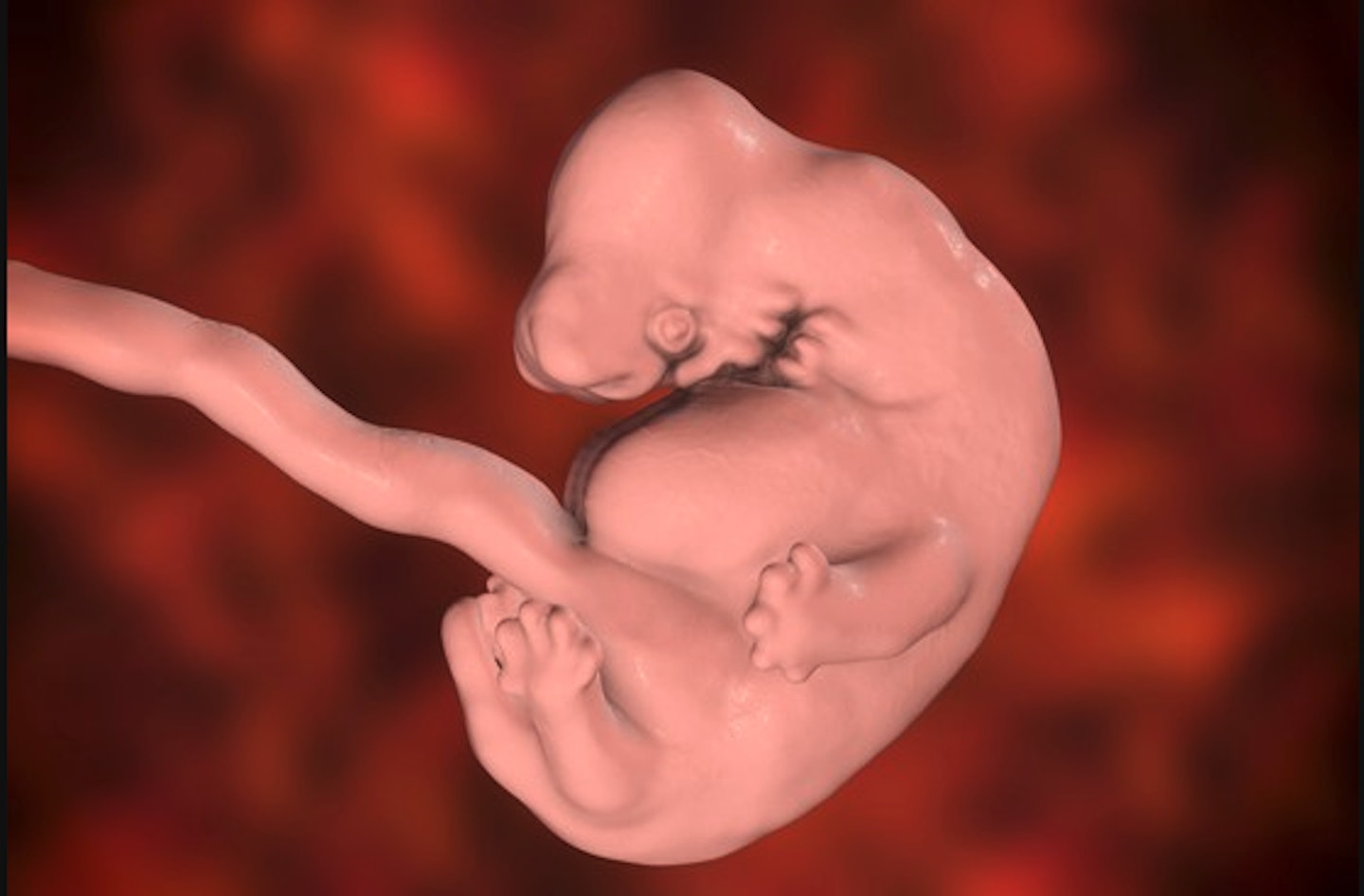
Medically Reviewed by: Dr. Tiffany Pham
If you've had a positive pregnancy test and are now coming to terms with your exciting news, you may be wondering whether you should be feeling any different yet. You might not feel any symptoms at the moment, as it's still very early days. However, it's important to learn about what is happening to your body right now, as the first trimester can be tough on mums-to-be, especially if this is your first time and you don't know what to expect.
So, let’s talk about all the things that are happening to your baby and your body at six weeks pregnant. We've got expert information on your baby's development, any symptoms you might be experiencing this week, as well as answer to some common questions.
How many months is 6 weeks pregnant?
At 6 weeks pregnant, you’re about 1 month and 2 weeks along, and just starting to settle into your second month of pregnancy. With only 7 months left to go, it’s an exciting time, even if the calculations are tricky to grasp!
Here’s how it works: pregnancy is typically measured in weeks, starting from the first day of your last menstrual period (LMP), even though conception happens about two weeks later. This means that at 6 weeks, you’re still in the early days, but your baby is already developing at an incredible rate.
While you might not quite feel 2 months pregnant yet, you’re getting close! Many mums-to-be only discover they’re expecting around this time, so if you’re just finding out... congratulations!
How many weeks in 2 months?
The number of weeks in 2 months isn’t as straightforward as it seems, because months vary in length. On average, a month is about 4.3 weeks long, so 2 months works out to roughly 8 to 9 weeks.
If you’re tracking pregnancy, things can feel a little different, since it’s counted in weeks from the start of your last menstrual period (LMP). By the time you hit 8-9 weeks, you’re well into your second month and likely starting to notice some early pregnancy symptoms, like fatigue or nausea.
Remember, every pregnancy journey is unique, so focus on each milestone as it comes – one week at a time.
How big is my baby at 6 weeks?
Your 6-week fetus is still very tiny, measuring about the size of a lentil or sweet pea. Dr Tiffany Pham, a board-certified obstetrician and gynaecologist says this is "approximately 0.2in or 5-6mm on average."
6 weeks pregnant fruit
Your little one is still to small to compare its size to a whole fruit, which is why we've substituted with a lentil or pea. You might not be feeling much yet, but don't worry, there’s a lot happening behind the scenes...
Baby development at 6 weeks pregnant
Your baby has been doing some serious growing over the past few weeks and one of the main events this week is that they'll develop their face and double in size by next week. That's right, your little one's facial features are starting to form!

Here's a breakdown of your baby's developments this week...
Facial features begin to form
"Certain body parts such as the nose, eyes, mouth, and ears will start to form," explains Dr Tiffany. Tissue folds are developing that will soon become your baby’s face. Tiny openings that will become the mouth and nostrils will be visible in a few weeks. Dark patches indicate where the eyes will eventually form, and small folds on the sides of the baby’s head will become ears.
Limb buds development
"Four tiny limb buds that will eventually develop into the arms and legs are also beginning to take shape,” says Dr Tiffany. These buds are the early indicators of future limb development, marking the initial steps in the formation of the baby's arms and legs.
Nervous system development
The nervous system is forming from a structure called the neural plate, which becomes visible around the 16th day of development. A groove forms down the middle of the plate, and its edges curl up to create the neural tube. The front part of this tube will develop into the brain, while the remainder becomes the spinal cord. At this stage, the developing spinal cord looks similar to a tail due to its rapid growth.
Skin formation
"At this point, the baby will also have a thin layer of skin covering the entire body," adds Dr Tiffany. This early skin layer provides a protective covering as the baby's body continues to develop.
Neural tube closure
The neural tube, which eventually forms the brain and spinal cord, closes by the end of the fourth week of pregnancy. Failure to close properly can lead to neural tube defects such as spina bifida or cleft lip/palate. Taking folic acid supplements is crucial during early pregnancy to help prevent these defects.
Heartbeat
Around this time, the baby's heart starts to beat at a rate of about 110 beats per minute or more. This heartbeat can often be detected via ultrasound during this week, marking an important milestone in the baby's development.
Organ development
Essential organs such as the lungs, liver, and kidneys are beginning to form. These organs will continue to develop and mature throughout the pregnancy, preparing the baby for life outside the womb.
Umbilical cord
By the six-week mark, the baby is connected to the mother through the umbilical cord. This crucial structure supplies nutrients to the baby and removes waste, supporting the baby’s growth and development throughout the pregnancy.
Where is baby located at 6 weeks?
At 6 weeks pregnant, your baby is still in your uterus, and has securely implanted into the uterine lining where it’s growing rapidly . At this stage, your baby is called an embryo, and although it’s small, it’s already starting to develop important structures like the heart, brain, and spinal cord. While you can’t feel your baby yet, this is when things start to change quickly.
Bump at 6 weeks pregnant
At 6 weeks pregnant, you’re unlikely to have a noticeable bump just yet, as your baby is still too small. Most of the changes happening at this stage are internal, with your body beginning to adjust to the pregnancy and produce more pregnancy hormones.
That said, some women might experience a slight bloating or a feeling of fullness in the abdomen, which can make you feel like your bump is starting to show. This is completely normal and often due to hormonal changes and increased blood flow to the area.
Your baby’s growth will pick up speed soon, and by the time you reach 12 weeks, you might begin to notice a more visible bump as your uterus expands to accommodate your growing little one. For now, it’s all about those early internal changes!
Your body at 6 weeks pregnant
Although you probably won’t look any different on the outside, you might be feeling queasy, bloated, or craving foods you’ve never wanted before. You may also experience an increased need to urinate, especially at night. This pressure will be relieved once your uterus rises at the beginning of the second trimester. Despite the inconvenience, it's essential to stay hydrated. Leaning forward when you urinate can help ensure your bladder is fully emptied each time.
"Body changes and symptoms that occur in pregnancy can vary from person to person. While some people may experience these changes at this stage in their pregnancy, others may not, thus there is no expected ‘normal’ but rather varying degrees of these changes may be present for some people," says Dr Tiffany.
Bloating
This one is down to the progesterone that’s flying around your body right now. Remember to eat lots of fibre and drink plenty of water to avoid getting constipated, which will only make that horrible bloated feeling worse.
Heartburn and digestive changes
The muscular band at the top of your stomach relaxes due to rising pregnancy hormone levels. As your pregnancy progresses and the uterus continues to grow, this band relaxes further, increasing the likelihood of heartburn. Normally, this band prevents stomach contents from backing up, but during pregnancy, its relaxation can lead to discomfort. To minimise symptoms, eat slowly and take your time during meals.
Uterus growth
Your uterus is expanding significantly, with its weight potentially increasing from 70g to 1100g, about 500 times its normal size. This growth depends on the baby's size, the number of babies, the amount of amniotic fluid, and any pathological conditions like fibroids.
Increased blood supply
During these first few weeks of pregnancy, you’ll have an increased blood supply to your uterus, breasts, kidneys, and skin. This heightened circulation supports the growing demands of your body and the developing baby.

6 weeks pregnant symptoms
Sore breasts
"You may experience changes to your breasts or nipples," says Dr Tiffany. "The breast may become more swollen or tender, and the nipples may darken in colour or become more prominent. These changes to the breast tissue help to prepare our bodies for breastfeeding."
Fatigue
"Fatigue can be a common symptom that you may experience throughout the first trimester of your pregnancy," says Dr Tiffany. "As levels of progesterone rise during pregnancy, it can contribute to the feeling of fatigue."
Your body is growing a baby, so it’s bound to be exhausted! Pay attention to your pregnancy fatigue and feel free to cancel those dinner arrangements and get an early night.
You can combat pregnancy fatigue by eatingenergy-boosting superfoods like red peppers, blueberries, dark chocolate, avocado to name a few.
According to midwife and parenting expert Rachel Fitz-Desorgher, it's important to listen to our bodies.
"Listening to your body is the most important thing to do in early pregnancy - the weird symptoms are evolved to keep you and your tiny embryo safe. So respond to overwhelming fatigue by resting as much as possible in the evenings and at weekends rather than trying to 'carry on as normal'."
Nausea and vomiting
"HCG or human chorionic gonadotropin, is a hormone that is present in pregnancy. The increase in HCG levels can contribute to symptoms of nausea in pregnancy," says Dr Tiffany.
Whether you’re feeling a little sick at the sight of your partner’s scrambled eggs, or you’re throwing up your breakfast, lunch, and dinner, relax and remember, morning sickness is one of the most common signs of pregnancy. If you are still being sick, snacking is key.

6 weeks pregnant scan
At 6 weeks pregnant, an early scan can provide a glimpse into your pregnancy journey. If you have a transvaginal ultrasound, the scan can usually detect your gestational sac and yolk sac, which are signs that the pregnancy is progressing. In many cases, the embryo itself may also be visible at this point, though it will still be very small.
One of the most exciting milestones at this stage is the ability to potentially see your baby’s heartbeat—which is often visible on the ultrasound screen. This is a huge moment for many mums-to-be, as it’s the first sign that the pregnancy is developing as it should.
While it’s still early, a 6 weeks pregnant ultrasound is often used to confirm that the pregnancy is in the uterus and not ectopic, which is an important step for reassurance. The scan can also help determine your due date more accurately.
Remember, though, that everyone’s experience is different, and the visibility of the heartbeat or embryo can vary depending on factors like the type of scan, the position of the pregnancy, and how far along you are.
Cramping six weeks pregnant
It’s completely normal to experience some cramping at 6 weeks pregnant, and it’s usually nothing to worry about. At this stage, your body is adjusting to the pregnancy, and mild cramps are often a result of implantation as your little one settles into the uterine lining. These cramps might feel like light period pains, and they’re a common early sign of pregnancy.
Your body is also working hard to support your growing baby, so the stretching of your uterus and increased blood flow to the area can cause a little discomfort too. As long as the cramping is mild, it’s typically just your body getting ready for what’s ahead.
However, if the cramps are sharp or severe, or if you notice any spotting, it’s always a good idea to reach out to your healthcare provider. While mild cramping is usually nothing to worry about, it's always better to check in with your doctor if you're feeling concerned.
Take it easy and trust your body—cramping can be completely normal, but don’t hesitate to get support if you need it!
Understanding miscarriage at 6 weeks
Miscarriage is a difficult experience that can happen in the early weeks of pregnancy, including at 6 weeks. While it’s a concern for many, it’s important to know that many pregnancies continue past this stage without complications.
At 6 weeks, early miscarriages are often due to chromosomal abnormalities that are beyond anyone’s control. Signs to watch for include bleeding and cramping, but some mild cramping and spotting can also be normal. If you experience heavy bleeding or severe pain, it’s important to contact your healthcare provider for reassurance and support.
Remember, if you do experience a miscarriage, it’s not your fault. Be kind to yourself, and seek support if needed.
What to speak to your doctor about at 6 weeks pregnant
Symptoms that may be abnormal or require contacting your GP or midwife can include:
•Severe or persistent abdominal cramping or pelvic pain
•Heavy vaginal bleeding (bleeding that is equivalent to a period or heavier, passing blood clots)
•Fever
•Changes to your vaginal discharge (watery, green/yellow in colour, discharge with an odour, clumpy thick discharge with itching or irritation etc)
•Severe or persistent vomiting
Looking after you at 6 weeks pregnant
Listen to your body
"Being in tune with your body and listening to its needs will help you navigate your pregnancy journey," recommends Dr Tiffany. "If you are feeling more tired, let yourself take naps or sleep longer. If nausea or food aversions become a problem, eating smaller meals throughout the day and avoiding foods that are problematic may be helpful."
Take folic acid
If you aren't already doing so, you should take 400 micrograms of folic acid every day throughout your pregnancy. This is to reduce the risk of problems in the baby's development in the early weeks of pregnancy. It is also advised to take a daily vitamin D supplement too. "You should also incorporate food sources that contain folate into your diet such as dark leafy green vegetables, fruit, seafood, beans, eggs, dairy products or meat and poultry," says Dr Tiffany.
Stop eating certain food
Now you're expecting, there are a few foods that are not safe in pregnancy. This includes foods made from unpasteurised milk, soft cheeses like brie and camembert (unless steaming hot), cold-cured meats and fish such as swordfish and raw shellfish.
Eat healthily
You should be eating plenty of vegetables, grains, nuts and animal protein for the baby's development and your health.
Drink plenty of water
Drinking several glasses of water will help relieve any digestive issues.
Exercise
Although you might not feel like it, try and fit some exercise in – perhaps a gentle walk or a pregnancy yoga class. The endorphins will help you feel better and it might help you get to sleep.
Other things to consider at 6 weeks pregnant
Register your pregnancy
Now is the time to contact your GP or a local midwife so you can arrange your booking appointment and discuss your antenatal care options. How you register will differ depending on where you live, some counties now allow you to self-refer to the hospital which involves filling out some online forms and they will then contact you to make your first midwife appointment. We recommend ringing your GP first who will then be able to tell you the best way to do this.
This appointment should happen before you are 10 weeks pregnant and will usually be done by a midwife. Your height and weight will be taken, your blood pressure measured. You might be asked to give a urine sample (which you probably won’t have a problem providing!) and have a blood test that will check your general health and blood group.
Another thing to expect is a lot of questions – so do your homework! Not only will they ask about your own health history, but also about your family's health history. Remember to make a list of questions for your midwife and ask them, no matter how silly they may sound.
Share your news
"Don’t be too afraid to keep your happy news to yourself - you might well need more support and understanding right now, especially if you are having a rough time," says Rachel. "So let your boss, friends and family know sooner rather than later so that they can understand when you need that extra nap or snack break."
About the experts
Dr Tiffany Pham is a board-certified obstetrician and gynaecologist and medical advisor for Flo Health, based in Houston, Texas. Pham is passionate about helping women get access to necessary health services and medically-accurate health information and better understand their bodies.
Rachel Fitz-Desorgher worked as a specialist midwife, infant feeding consultant and parenting consultant for over 30 years before deciding to leave midwifery in order to focus her expertise and experience on mentoring women transitioning from the busy world of work to motherhood.
About the author
Emily Gilbert is the Features & Reviews Editor for Mother&Baby and has written for the website and previously the magazine for seven years. Emily writes about everything from the top baby products to pregnancy, fertility and maternal mental health. Specialising in product reviews, Emily is the first to know about all the exciting new releases in the parenting industry.
